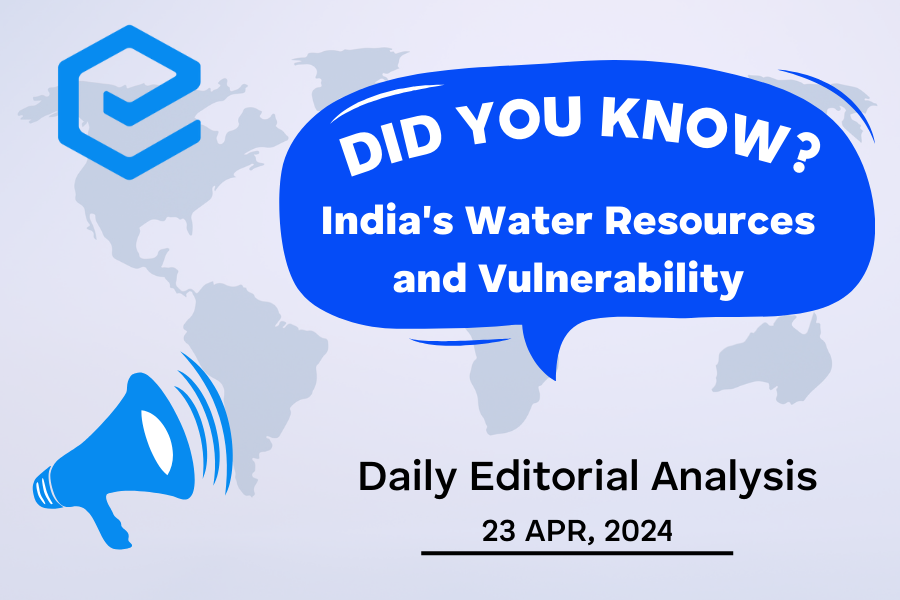
India’s water resources are under increasing strain due to a combination of factors, including population growth, urbanization, industrialization, and climate change. Rapid urbanization has led to the encroachment and pollution of water bodies, while industrial activities contribute to water contamination. Additionally, changing weather patterns exacerbate water scarcity and variability, impacting both surface water and groundwater availability. This vulnerability is further compounded by inefficient water management practices and inadequate infrastructure for storage and distribution. Addressing these challenges requires holistic strategies that integrate water resource management with sustainable development goals, emphasizing conservation, efficiency, and equitable distribution. Failure to do so risks exacerbating water insecurity and jeopardizing the well-being of millions of people across the country.
Tag: GS-3 Environment and Conservation
In News: IMD predicts hotter summer, longer heatwaves from April to June. India must prepare for water stress, shifting from panic reactions to understanding chronic risks. This Earth Day (April 22) is a wake-up call.
Contents
- 1 India’s Water Resources and Vulnerability
- 2 Conclusion
- 3 Frequently Asked Questions (FAQs)
- 3.1 FAQ: How severe is India’s water scarcity issue?
- 3.2 FAQ: What role does climate change play in India’s water vulnerability?
- 3.3 FAQ: How does pollution affect India’s water resources?
- 3.4 FAQ: What are the consequences of inefficient water management practices in India?
- 3.5 FAQ: How can India address its water resource challenges?
- 4 In case you still have your doubts, contact us on 9811333901.
India’s Water Resources and Vulnerability
Overview
- India supports 18% of the world’s population on just 2.4% of the Earth’s surface area, with a mere 4% of global freshwater resources.
- Approximately half of India’s rivers are polluted, and 150 primary reservoirs operate at only 38% of their total live storage capacity.
- The nation leads global groundwater usage, with three-quarters of its districts facing extreme climate events.
Investments in Disaster Preparedness
- Despite these challenges, India has made substantial investments in disaster preparedness. However, the evolving nature of climatic shocks necessitates continuous adaptation strategies.
Shift from Reactive to Proactive Approach
- India must transition from reactive responses to proactive measures, acknowledging the chronic nature of climate risks.
- Climate action requires broad participation across sectors, moving beyond short-term initiatives like sapling plantation drives.
Interconnectedness of Water with Economy
- Water in Agriculture
- Precipitation serves as a primary source of soil moisture, impacting crop irrigation and harvests. Agriculture, employing 45% of the population, remains vulnerable to climate changes.
- Changing monsoon patterns affect crop cultivation and emphasize the need for resilience-building measures.
- Water in Clean Energy Transition
- Water plays a critical role in the global clean energy transition, particularly in green hydrogen production and pumped storage hydropower.
- Addressing climate impacts on hydrometeorological disasters is imperative, with nearly 75% of natural disasters being water-related.
Key Strategies for Ensuring Water Security
- Integrated Water Governance
- India’s water governance must consider the nexus between water, food, and energy systems, integrating local evidence and community engagement.
- Judicious Water Use and Reuse
- Prioritizing efficient water use and reuse through water accounting principles is essential for achieving national goals like increasing water use efficiency by 20% by 2025.
- Financial Commitments and Market Innovations
- Greater financial commitments are needed for climate change adaptation in water and agriculture sectors, alongside market innovations like the Green Credit Programme to bridge the adaptation funding gap.
Conclusion
- India’s water supply, food security, and clean energy transition efforts are intricately linked to its economy and provide valuable lessons for other water-stressed nations.
- Coherence in water, energy, and climate policies, data-driven baselines for water savings, and new financial instruments are crucial for building a water-secure and climate-resilient economy.
| UPSC Previous Year Questions Mains (2020)Q. Suggest measures to improve water storage and irrigation system to make its judicious use under depleting scenario. Mains (2015)Q. India is well endowed with fresh water resources. Critically examine why it still suffers from water scarcity. |
Source: TH
Frequently Asked Questions (FAQs)
FAQ: How severe is India’s water scarcity issue?
Answer: India faces significant water scarcity issues, with a growing gap between water supply and demand. Rapid population growth, urbanization, and industrialization exacerbate this challenge, particularly in regions with already stressed water resources.
FAQ: What role does climate change play in India’s water vulnerability?
Answer: Climate change impacts India’s water resources by altering precipitation patterns, leading to increased variability in rainfall and more frequent extreme weather events. This results in droughts, floods, and erratic monsoon seasons, further straining water availability and management.
FAQ: How does pollution affect India’s water resources?
Answer: Pollution from industrial discharge, agricultural runoff, and untreated sewage contaminates India’s water bodies, rendering them unfit for consumption and other uses. This pollution not only threatens human health but also degrades ecosystems and reduces the availability of clean water for various purposes.
FAQ: What are the consequences of inefficient water management practices in India?
Answer: Inefficient water management exacerbates India’s water vulnerability by leading to wastage, inequitable distribution, and unsustainable exploitation of water resources. This can result in depletion of groundwater reserves, land degradation, and conflicts over water allocation.
FAQ: How can India address its water resource challenges?
Answer: India can address its water resource challenges through a combination of strategies, including improved water governance, investment in water infrastructure, promotion of water conservation practices, adoption of sustainable agricultural techniques, and public awareness campaigns. Integrated water resource management approaches that prioritize efficiency, equity, and environmental sustainability are crucial for mitigating water vulnerability in the country.
In case you still have your doubts, contact us on 9811333901.
For UPSC Prelims Resources, Click here
For Daily Updates and Study Material:
Join our Telegram Channel – Edukemy for IAS
- 1. Learn through Videos – here
- 2. Be Exam Ready by Practicing Daily MCQs – here
- 3. Daily Newsletter – Get all your Current Affairs Covered – here
- 4. Mains Answer Writing Practice – here

